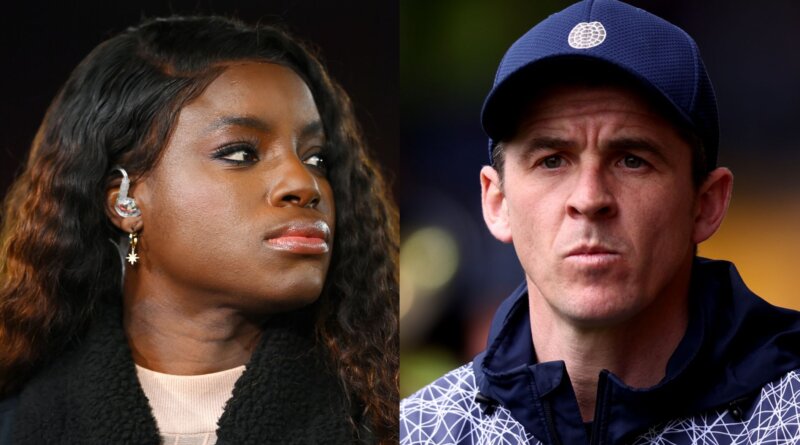Joey Barton Conviction Shocks Eni Aluko After Years of Support
Joey Barton conviction has left Eni Aluko stunned, revealing a dramatic shift from private encouragement to public abuse over four years. The former Manchester City and England midfielder was found guilty on six counts for posting “extreme” and “grossly offensive” social media content targeting Aluko and fellow broadcasters Lucy Ward and Jeremy Vine. Barton’s posts, which went far beyond criticism, have now resulted in a criminal conviction and opened a wider debate on online conduct and responsibility.
Joey Barton Conviction and Its Background
The Joey Barton conviction stems from a prolonged legal battle, during which prosecutors argued that the 43-year-old crossed the line between free speech and criminal behavior. Using his massive following of 2.7 million on X (formerly Twitter), Barton accused Aluko of being given punditry positions to “tick boxes” in the wake of the “George Floyd nonsense,” questioning her role in men’s football coverage and stoking outrage online. Such remarks were found to be not only offensive but also incited harassment against Aluko and other broadcasters.
Eni Aluko’s Shock Over Joey Barton Conviction
For Aluko, the Joey Barton conviction was particularly jarring given their previous positive interactions. She shared with Sky News that Barton had once congratulated her on her football career milestones, including her move to Juventus and her role as a sporting director at Aston Villa. “Four years before these awful posts, he was congratulating me on my career and saying lovely things,” Aluko recalled, expressing her disappointment at Barton’s transformation. She described his later actions as “malicious and disappointing,” emphasizing the calculated nature of his online attacks.
Impact of Social Media Abuse: Aluko’s Call for Change
The Joey Barton conviction has reignited calls for greater accountability on social media platforms. Aluko, who earned 105 caps for England, has urged tech companies to take stronger measures to protect users from abuse and hate speech. “Social media companies like X aren’t listening. They actually reward hate speech, which is why somebody like Joey Barton thinks, ‘to promote my podcast, I’m going to say extreme things.’ It’s the reward system; it’s become a business,” she noted.
Aluko advocates for regulatory bodies like Ofcom to introduce fines for companies that fail to curb racism, sexism, and hate speech. She stresses the real-world consequences of online abuse, stating, “It’s not just hurty words. If you are consistently harassing somebody or inciting violence, there are consequences to that in the UK.”
Aftermath of the Joey Barton Conviction
In the aftermath of the Joey Barton conviction, Aluko expressed relief and described herself as feeling “10 times lighter.” The emotional toll, however, has been significant for her and her family. She hopes the verdict will prompt others to reconsider how they behave online: “I think people should really take note of what that looks like, so that you regulate your own conduct online and make sure that you’re not crossing the line.”
Barton’s conviction has also cast doubt on his future in football. Since his dismissal as Bristol Rovers manager in October 2023, he has been out of professional football, instead hosting a podcast titled ‘Common Sense with Joey Barton.’ Aluko believes his actions have come at a steep personal and professional cost, noting, “If he ever wanted to work in football, I’m not sure that’s ever going to happen, given his conduct towards other people in the game.”
Broader Implications and Aluko’s Plea for Rehabilitation
While the Joey Barton conviction is a personal victory for Aluko and others targeted, she stresses the importance of self-reflection and rehabilitation. “I’m a believer in rehabilitation, and somebody reflecting and doing the work to improve as people, so that will be down to him,” she said, emphasizing hope that Barton can learn from the consequences of his actions.
The Need for Greater Social Media Accountability
The Joey Barton conviction highlights the urgent need for social media reform. Aluko’s experience demonstrates how online platforms can amplify harmful voices, embolden others to follow suit, and cause genuine harm. She calls for systemic changes to ensure those who incite or perpetuate hate face tangible consequences, and for social media companies to prioritize user safety over engagement-driven business models.
For more news and updates on football and social issues, visit our homepage for more news.
Opinion: A Turning Point for Online Accountability
The Joey Barton conviction represents a critical moment for football and digital culture. Aluko’s resilience serves as a powerful reminder of the human cost behind online abuse. With this verdict, the message is clear: public figures are not above the law, and social media must not become a safe haven for hate. It’s time for platforms, regulators, and fans to work together for a safer, more respectful online community.
Your global gateway to nonstop football coverage:
News Goal
Share this content:
